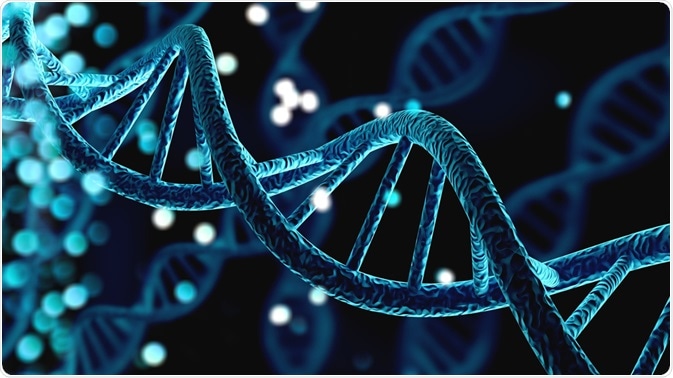DNA methylation is an epigenetic modification that has a pivotal role in the regulation of gene expression in mammalian cells. Recently, its role in carcinogenesis has been a topic of growing interest.

DNA. Image Credit: Billion Photos/Shutterstock.com
The molecular basis of DNA methylation
The DNA methylation includes covalent addition of a methyl group (–CH3) that occurs exclusively at the 5 position of the cytosine ring, which is observed within CpG dinucleotides (5´CG3´). Non-CpG methylation is not common although 5-methylcytosines have been found within CpA and CpT dinucleotides. Non-CpG methylation might be correlated to the maintenance and origin of the pluripotent state.
These CpG dinucleotides are clustered in large regions, called CpG islands that are enriched mostly in the first exon region and/or promoter. Approximately 60% of human promoters have high-CpG content. CpG islands are unmethylated, a 200-bp region of DNA with GC rich content (60% to 70%) with a ratio of CpG to GpC of at least 0.6. CpG islands can help in the prediction of active or potentially active promoter areas.
If the genes are expressed, the CpG sites in the CpG islands of promoters are usually unmethylated. DNA methylation usually inhibits gene expression. In normal cases, CpG islands are unmethylated in transcriptionally active genes, whereas methylation within the promoter region results in gene silencing. Methylated CpG islands have a role in aberrant methylation patterns in cancer, X-inactivation, genomic imprinting, and gene silencing during cell differentiation.
DNA methylation abnormalities in cancer
Proper cell function requires appropriate DNA methylation so any aberrations in DNA methylation could lead to several diseases, including cancer. Different methylation forms such as hyper- and hypomethylation events can be observed in cancer.
Hypermethylation involves CpG islands, whereas hypomethylation commonly includes repeated DNA sequences, such as long interspersed nuclear elements.
Hypomethylation in Cancer
Pericentromeric heterochromatin is densely methylated in normal cells. Genomic stability and integrity are ensured by silencing satellite sequences, repetitive genomic sequences (such as Alu elements, IAP, LINE, and SINE). Yet, disruption of this mechanism and loss of DNA methylation of normally inactivated regions are observed in a wide variety of tumors.
Therefore, undesired mitotic recombination is very likely to occur. As a consequence, reactivation of transposable elements is occurred, leading to the integration of these transposable elements at random sites in the genome with a high chance of mutagenesis and genomic instability. The end result is tumor development, which may be associated with distinct cancer stages.
For instance, loss of DNA methylation of Satα (centromeric satellite α) and Sat2 (juxtacentromeric satellite 2) in breast cancer is associated with early development tumor stages while in ovarian cancer they contribute to the progression of tumor and was proposed as being a very important marker of poor prognosis.
DNA methylation loss could also trigger latent viral sequences incorporated in the genome, a process that may be correlated to tumor progression. For example, CpG methylation represses genomes of genital human papillomaviruses.
Hypomethylation of DNA allows reexpression of human papillomaviruses, which may be accompanied by the progression of cervical cancer. Epigenetic modifications may control the Epstein–Barr virus latency, which is related to various lymphoma types.
The expression of nuclear antigens, which could be responsible for the oncogenic properties of some alternative promoters, is repressed by DNA methylation. Hypomethylation is common in solid tumors including prostate tumors, cervical cancer, metastatic and hepatocellular cancer, and also in hematologic malignancies such as B-cell chronic lymphocytic leukemia.
The global hypomethylation observed in different cancer types, such as brain, cervical, and breast, is correlated with a progressive increase with the malignancy grade.
Hypermethylation in Cancer
Despite global hypomethylation observed in cancer, specific genes are inactivated as a result of hypermethylation of CpG islands in regulatory regions, which are unmethylated in normal tissues. This was first reported in the studies performed on retinoblastoma patients in which scientists discovered hypermethylation in the promoter of the retinoblastoma tumor-suppressor gene.
After that, a great number of studies reported the occurrence of tumor-suppressor genes silenced by DNA hypermethylation in tumor tissues. DNA methylation-associated silencing has a pivotal role in the production or formation of tumors and is considered to be a hallmark of all types of human cancer. There are different protective mechanisms such as local chromatin structure preventing access to the DNA methyltransferase, active demethylation, replication timing, and active transcription which can inhibit the hypermethylation of the CpG islands.
Several tumors exhibit some kind of hypermethylation on one or more genes. One of the most detailed studies was performed on lung cancer, and scientists found that more than 40 genes have some sort of alteration in DNA methylation patterns.
Hypermethylation may result in loss of expression of many genes including cell adhesion genes, inhibitors of matrix metalloproteinases, and steroid receptor genes that are important in breast cancer development. Hypermethylation is also reported in many leukemias and other hematologic diseases. In general, studies of hypermethylation in cancer exceed the studies of hypomethylation in cancer.
References
- Baylin SB. DNA methylation and gene silencing in cancer. Nature clinical practice Oncology. 2005 Dec;2(1): S4-11.
- Das PM, Singal R. DNA methylation and cancer. Journal of clinical oncology. 2004 Nov 15;22(22):4632-42.
- Jones PA. DNA methylation and cancer. Oncogene. 2002 Aug;21(35):5358-60.
- Kulis M, Esteller M. DNA methylation and cancer. Advances in genetics 2010 Jan 1 (Vol. 70, pp. 27-56). Academic Press.
- Luczak MW, Jagodziński PP. The role of DNA methylation in cancer development. Folia histochemica et cytobiologica. 2006;44(3):143-54.
- Momparler RL, Bovenzi V. DNA methylation and cancer. Journal of cellular physiology. 2000 May;183(2):145-54.
- Taberlay PC, Jones PA. DNA methylation and cancer. Epigenetics and Disease 2011 (pp. 1-23). Springer, Basel.
Further Reading
Last Updated: Feb 10, 2021